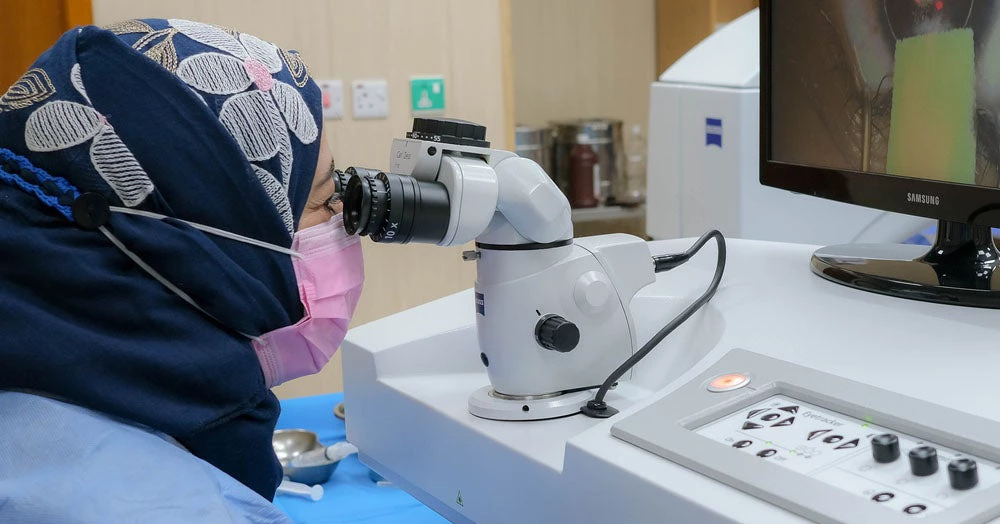 An opthalmalogist in Basra, Iraq, looks at lab results.
An opthalmalogist in Basra, Iraq, looks at lab results.
As we mark International Women’s Day this month, we spotlight the main hurdles to women’s labor force participation in Iraq to shape future programs and policies for enhanced equality in the labor market for all individuals.
Iraq has one of the lowest female labor force participation (FLFP) rates (11%) among countries in the Middle East and North Africa (MENA) region. This figure does not just represent disparities between women and men; it is a missed opportunity to spur economic development. In fact, a projected 5 percentage points (pp) increase in Iraq’s FLFP by 2025, in line with the Government of Iraq’s policy objective, could boost its GDP by an estimated 1.6 pp, driving economic rejuvenation and poverty reduction.

To understand the social drivers behind the low FLPF in Iraq and explore ways of empowering women in the workforce, we surveyed nearly 2,000 individuals, aged 20 to 55 years, living in urban settings in Baghdad, Basrah, and Nineveh, between March and April 2021 using Bicchieri’s framework for diagnosing social norms. Of those surveyed, 34% of women and 59% of men were employed. Among male respondents, 27% had female relatives (wife, sister, or daughter) who were employed, while 73% did not. Detailed survey analyses and recommendations for unlocking economic development through FLFP in Iraq are included in this World Bank report titled "Community and Intra‑household norms against women’s work in Iraq: what matters?"
The data unveils seven compelling insights:
-
88% of respondents support women working. Also, 81% of respondents did not object to women working outside the home, and 82% did not object to married women working.
-
This approval begins to dwindle as work conditions become less fitting for women according to societal expectations. The support dropped to 57% for mixed-gender workplaces and to 37% if women were to return home after 5 p.m.
-
Respondents overestimated the actual percentage of women working in their communities (believing it to be 40%, when in reality, it is as low as 12%).
-
Conversely, they underestimated societal support for women working, believing only 38% support it in their area, when in reality, a significant 88% endorse women working.
-
Moreover, while 52% of non-working women expressed a desire to work, especially if supported by a spouse or parent (75%), only 10% are actively seeking employment.
-
Key barriers to women entering the workforce include childcare responsibilities (32% of non-working women prefer caring for their children over work), unsuitable job opportunities (15%), and lack of familial support including discouragement from husbands (13%). As highlighted in this flagship report titled "Who Cares? Care Work and Women's Labor Market Outcomes in Iraq, Jordan, and Lebanon," a lack of access to quality and affordable childcare as well as cultural preferences for personal child-rearing over formal childcare arrangements can restrict women’s economic opportunities. In Iraq, where merely 1% of children use formal childcare services, societal norms are challenged by the reality that 49% of working mothers demand such services.
-
Women’s work options are restricted by mobility constraints and societal norms: only 4% of men approve of their wives working outside the home beyond 5 p.m. , working in the private sector, or mixing with men at work. Nearly half of women (47%) prefer public sector jobs due to shorter hours, benefits, and alignment with social norms, highlighting the significant impact of these societal constraints on women’s employment choices.
Women in Iraq face challenges to entering and remaining in the labor market, including legal and market constraints. Our analysis revealed that social norms, shaped by personal beliefs, family expectations, and gender stereotypes, significantly impact women’s work decisions. To enhance FLFP and help contribute to Iraq’s economic development, reshaping societal mindsets is crucial.
Drawing from the survey findings, a range of policy and program recommendations have been proposed, many of which are being advanced through the World Bank’s Mashreq Gender Facility Initiative in Iraq. These recommendations include introducing more flexible work arrangements, addressing women's preferences for shorter commutes, reducing working hours, and flexible work arrangements, like remote work, to make existing opportunities more appealing.
-
Promote Childcare Services: Overcome childcare responsibilities as a barrier by increasing access to good quality and affordable childcare services and encouraging families to utilize such services. This can be achieved by improving supply and positively shifting perceptions about the role of childcare alongside parenting.
-
Promote Job Search Activities: Research should further explore why non-working women are not seeking jobs, to design interventions that encourage their engagement in job search activities.
-
Address Misperceptions about Social Acceptance of Working Women: Develop communication strategies to address misperceptions on societal acceptance of women working and to showcase successful working women as community role models.
-
Support Home-based Businesses: Leverage positive views on women operating home-based businesses by linking interested women to programs providing access to finance, technical support, and training.
Greater equality between women and men in the labor market goes beyond enhancing labor statistics or achieving GDP growth, it is about empowering women and girls . It is also a crucial step in creating a poverty-free, equitable, and prosperous Iraq. Read our report on Gender and Social Protection in Iraq and visit our website to learn more about how the World Bank uses behavioral insights to fight global poverty.



Join the Conversation